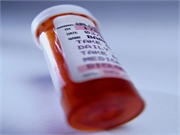Dasatinib Tops Imatinib for Ph+ Acute Lymphoblastic Leukemia
Four-year cumulative risk of any relapse lower for dasatinib in the context of intensive chemotherapy
New Guidance Issued for Care of Children With Williams Syndrome
Children with WS should be evaluated by a pediatric cardiologist, undergo psychoeducational evaluation
ACP: Medicare for All Needed to Fix ‘Ill’ U.S. Health Care System
American College of Physicians has endorsed two proposals being discussed by Democratic presidential candidates
Acute Flaccid Myelitis Features Differ in Peak, Nonpeak Years
Patients with AFM onset in peak years are younger, more often positive for enterovirus, rhinovirus RNA
Level of Antibiotic Prescribing High for Children in Tennessee
Nearly 25 percent of overall, broad-spectrum antibiotic prescriptions written by 1.7 percent of providers
High-Dose Erythropoietin No Benefit for Extreme Preemies
No reduction found in risk for severe neurodevelopmental impairment or death at 2 years of age
Coronary Artery Disease Risk Down in Survivors of Childhood Cancer
Risk for coronary artery disease significantly decreased for survivors with diagnosis in 80s, 90s versus 70s
Cesarean Rates No Higher for Diabetes Patients Induced in 38th Week
But compared with expectant management, induction at 38 weeks tied to certain neonatal adverse outcomes
Single-Payer System Would Likely Save Money
Largest savings predicted to come from simplified billing and lower drug costs
2003 to 2017 Saw Drop in Infant Mortality Due to Birth Defects
Considerable variation found in the decrease, with smallest decline for infants born to black mothers



















